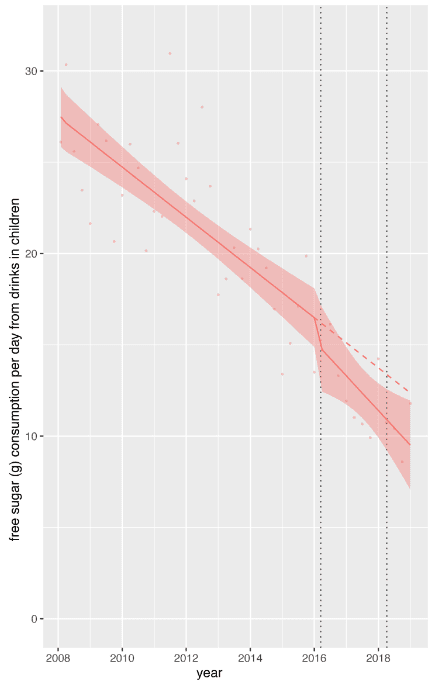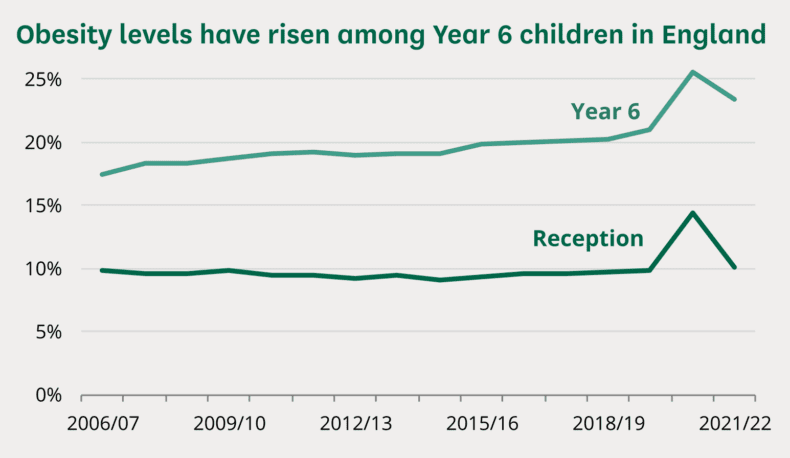The Guardian is trying to find out how gullible its readers are. How else can you explain a headline like ‘Children’s daily sugar consumption halved just a year after tax, study finds’? It can only be deliberate. The alternative explanation is that Guardian journalists cannot read a simple study and are highly credulous, but since that is unthinkable we must assume that such headlines are designed to be idiot tests.
Did children’s sugar consumption halve after an 8p tax was put on a can of Coke? Of course not. And that is not what the study claimed. The study claimed that children’s sugar consumption from soft drinks halved between 2008 and 2019, with nearly all the decline occurring before the sugar tax was introduced in April 2018.
Its authors used data from the National Diet and Nutrition Survey which does indeed show a steep decline in both sugary drink consumption and overall sugar consumption since 2008. The consumption of sugar from soft drinks by children fell from 27 grams per day in 2008 to 10 grams per day in 2019 (-63%) and overall sugar consumption by children fell from 70 grams to 45 grams per day over the same period (-36%).
The authors of the study modelled the data and estimated that the sugar tax accelerated the decline in sugar consumption. They conclude that children’s daily consumption of sugar from soft drinks would be three grams higher if the sugar tax had not be announced (that’s twelve calories). The graph below shows the trend line with the counterfactual represented by the dotted line.

.
In this graph, there seems to be a steepening of the trend in early 2016, which the authors attribute to the sugar tax announcement. The trend line looks a bit odd. Not only are most of the data points outside the confidence intervals, but if you look carefully at them, the steepening seems to have started in 2015, not 2016. That would make sense since 2015 was when the hysteria about sugar really got started in the UK, with Jamie Oliver campaigning for a sugar tax and Action on Sugar working at full throttle. Moreover, the authors admit that the ‘decline in consumption of free sugars was observed in the whole diet rather than just soft drinks’.
But if the acceleration in the downward trend happened in 2015, it is impossible to attribute it to the sugar tax. Even if it happened in 2016, the case for the sugar tax is pretty feeble. The tax was announced in March 2016 but it was not introduced until April 2018, more than two years later. It has been argued that the mere announcement was enough to get the soft drinks industry to reformulate their products with less sugar, thereby driving down sugar consumption, but this did not happen straight away. As a study published in 2020 showed, most of the reformulated products were not launched until late 2017 or early 2018 and therefore cannot have been responsible for reduced sugar consumption in 2016.

.
The real story here is that sugar consumption has been falling for years and rates of obesity have not. I was a voice in wilderness when I pointed this out ten years ago, but it is the truth. The decline in sugar consumption did not begin in 2008 but has been going on for decades. Per capita consumption of sugar peaked in the 1970s when obesity rates were very low. Since then, consumption has declined so much that the average Brit now meets the World Health Organisation’s target of getting no more than 10% of their daily energy from free sugars (in the UK the guideline was halved to 5% in 2015 to ensure that the hysteria can never end).
Not unpredictably, the authors of the study – who include a man who literally believes that God told him to lobby for a sugar tax – say that the ‘success’ of the sugar tax shows that the government should extend it to food. Perhaps they will get a sympathetic hearing from the new Health Secretary Wes Streeting, who has told the food industry to ‘either get on board the steamroller or you’re going under it’.
You can see what ‘success’ looks like in the graph below. Meanwhile, the Guardian has changed its headline to ‘Children’s sugar consumption halved since tax announcement, study finds’ which is still completely wrong.

Click here to subscribe to our daily briefing – the best pieces from CapX and across the web.
CapX depends on the generosity of its readers. If you value what we do, please consider making a donation.


